Scott Herrington of Turbine
Turbine's Scott Herrington interviewed
Since the first public beta tests of the game last year, Asheron's Call has quickly grown to become one of the biggest massively multiplayer games in the world, with thousands of players online at once.
We talked to Asheron's Call's producer, Scott Herrington, to find out more about the game, its development, and its future...
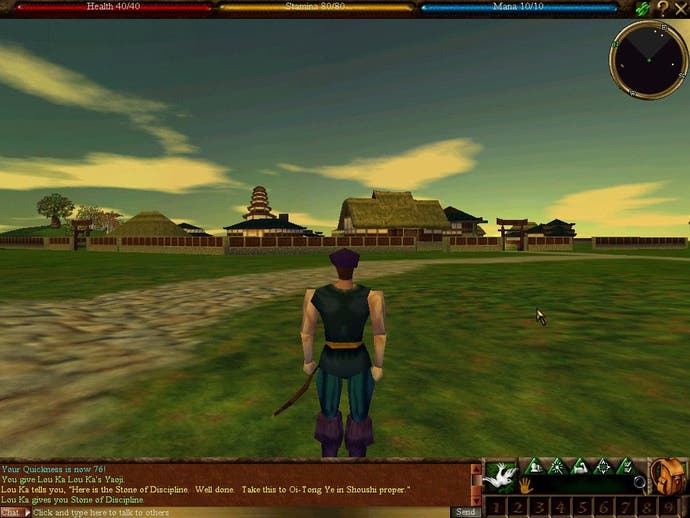
The Blades Start Spinning
Amazingly Asheron's Call is the first game to be developed by Turbine, a company founded by a mixture of students, university drop-outs and scientists with little or no previous experience in game development. For most of them, Asheron's Call would be the first commercial game that they had worked on.
As Scott told us, "It started with a group of guys sitting around and thinking, "Hey, wouldn't it be cool to make a 3D MUD?" Being that they were in the computer science department at Brown University, well .. the rest just sort of seemed to fall into place."
The game soon started to take shape, and "everyone on the team contributed a little bit" to the design and setting of the game. "Lots of traditional pen and paper RPGs like D&D and GURPS had their influence, and fantasy novels like the Tolkien books, among others, helped us realize what we had to do to create a compelling and believable world for people to explore."
At the time what Turbine was doing was unheard of. This was back in 1995, and Ultima Online, Everquest, and even the venerable Meridian 59 were yet to be released. But as work continued on Asheron's Call other massively multiplayer fantasy RPGs started to appear. According to Scott though, Turbine "were actually encouraged by Ultima Online and Everquest when we were in development".
"Ultima Online proved that a game like this could succeed. Everquest proved that there were enough people to support more than one game like that! We viewed their successes as proof that the concept of a massively multiplayer RPG was viable."
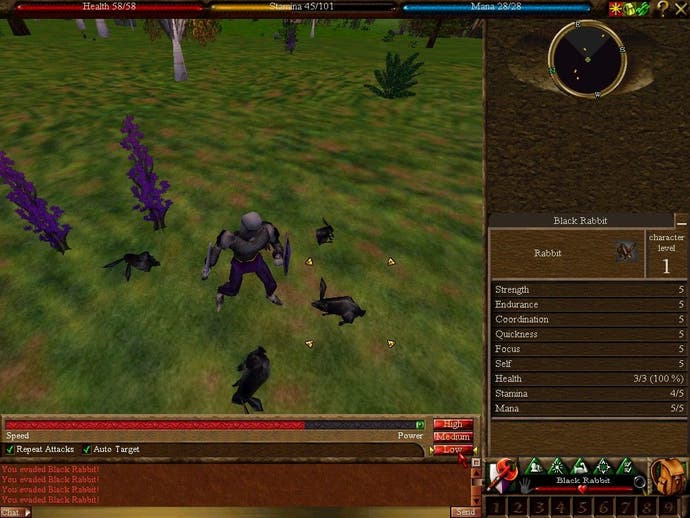
Release
Finally, in 1999, Asheron's Call entered open beta, attracting thousands of volunteers from around the world as it launched on "The Zone", the online gaming portal of publisher Microsoft.
"You're always surprised by the response when you put a game out there", Scott told us. "The number of fan sites blew us away, as did the overwhelming popularity of the allegiance system."
The allegiance system is one of the many features that separates Asheron's Call from similar games, allowing characters to swear fealty to each other. Some allegiances now have monarchs with as many as a few hundred followers, generally supplying them with assistance, equipment and money, and in return earning experience points from their followers as they advance in level.
"If anything, it's been better than we expected. I'd like to expand a bit more on it in the next several months, but for the most part it's been a great tool to get people into the social aspect of the game - which is the reason that they're playing the game online in the first place!"
When it came time to launch the game for real, all the extensive testing paid off, as Asheron's Call's launch "was the smoothest of the 'big three' online RPGs, and that was a huge relief!"
After almost five years in development at a company that had gone from a dozen people working on subsistence wages in a suburban house to a massive team with their own offices and support from Microsoft, Asheron's Call had arrived.
The game has proven to be both a critical and commercial success, and Scott's only regret is that "I would have liked to have been involved in the project a bit earlier than I was - there were some decisions that I probably would have liked to have had some input."
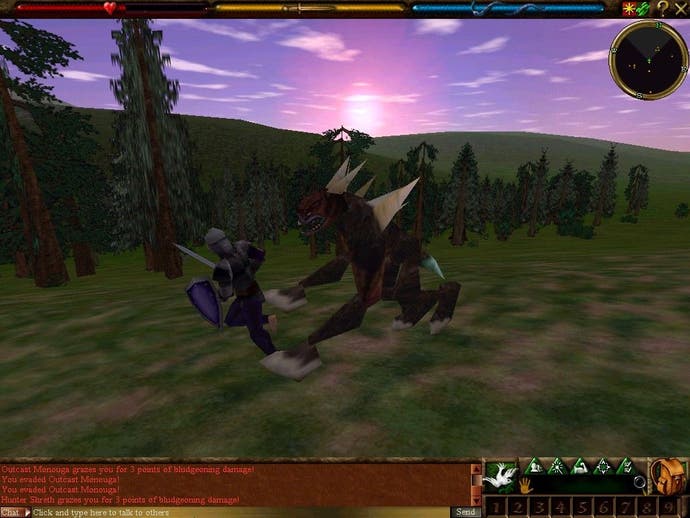
Balancing Act
Despite the huge success of Asheron's Call, Scott admits that "I'm never 100% happy with the balance in the game. There are always balance issues that are created whenever something is added to the game - and unfortunately, we do that monthly!"
The issue of play balancing is a difficult one, as you are always going to upset somebody when you change it. Other games have seen full scale revolts by their inhabitants in the past, and trying to please everybody all the time is a hard task.
"Our goal is to always 'give' players something, rather than taking something away", Scott told us. "So if something is too powerful, either we will give something that can counter-act it, or we will boost up everything else to bring it back into line."
"Sometimes that just isn't possible though, so occasionally we may find ourselves in a position where we have to 'nerf' something. We don't like to do it, but our number one goal is the long term health and balance of Asheron's Call as a game world that everyone can enjoy."
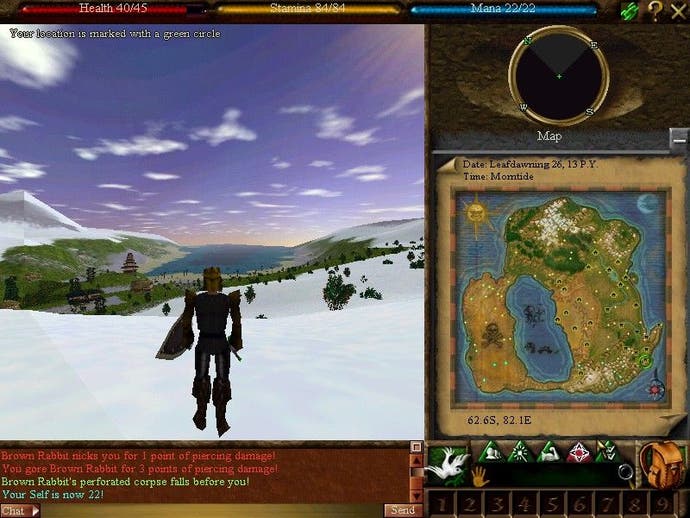
Wired World
One of the biggest features that makes Asheron's Call stand out from the crowd is its on-going storyline. There are regular monthly events that have seen Dereth, the world in which the game is set, covered in snow, threatened by evil shadows, and even destroyed in a hail of meteors and fire at the end of the public beta test!
"At a plot level, we've got the world story planned out for the better part of another year still", Scott told us. "We look at the story, match it to the content or features we're adding in any given month, and figure out how much of that story we can tell. The nitty gritty details of each event are planned a little over a month or so in advance."
And the players themselves have a big say in what happens in Dereth. Scott explained that "they help determine what kinds of content we need to add, or what features need to be put in there. That's partially through examination of the character databases, reading message boards, and playing the game 'undercover'."
The game has attracted an almost fanatical following, and some of the things that players get up to surprises even Turbine... A few examples? "The allegiance that made real life donations to charities over the holidays. The catering service that has sprung up in game. The 'fight nights' on Darktide. The wealth of stories that people make up to fill in the plot holes we leave."
"One guy actually came up with an Asheron's Call cosmology from studying the moons and stars at night!"
Not everything that the players get up to pleases Turbine though. Something which has plagued every big multiplayer RPG is the selling of characters and equipment on sites like eBay. High level characters and powerful artifacts can exchange hands for hundreds of dollars in some cases.
"We don't say that it isn't allowed, but I'm not crazy about it", Scott admitted. "I don't like the fact that if you've got money outside of the game you can buy power in the game. The game is a place where everything should be decided by your actions there .. not by your personal wealth outside of the game."
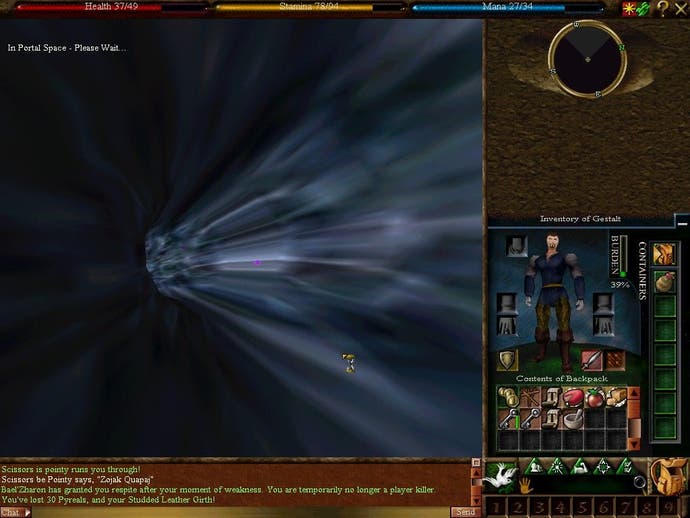
PK
One place where having a powerful character is particularly important is the world of Darktide, the only Asheron's Call server where every player is by default able to kill and be killed by other players.
"Darktide was really a social experiment for us", Scott told us. "The allegiance system there really took off, and means something to the players."
On Darktide, any other player can attack you at a moment's notice, and having powerful allies and being part of a strong allegiance that can defend you and help you to survive your first few weeks as you build up your character is obviously very important.
Unfortunately it can also breed an atmosphere of paranoia though, as you can never be sure who to trust unless they are a member of your own allegiance. All too often players prey on much weaker characters who don't stand a chance of defending themselves, or ambush them in the towns while they are trying to buy or sell goods at a shop. The result is chaotic to say the least, and the towns of Darktide make the wild west look like the epitome of law and order.
"Yes, there is a lot of unchivalrous behavior there", Scott admitted. "We may make some minor tweaks to help out players while they are shopping and whatnot, but it's a low priority for us since it effects only a portion of the total Asheron's Call population."
Darktide is just one of the six servers currently running Asheron's Call, and usually there are only half as many players on Darktide as there are on any of the normal game servers. As Scott pointed out, "whenever we devote resources to doing stuff especially for Darktide, that development time doesn't give players on the other worlds any benefit."
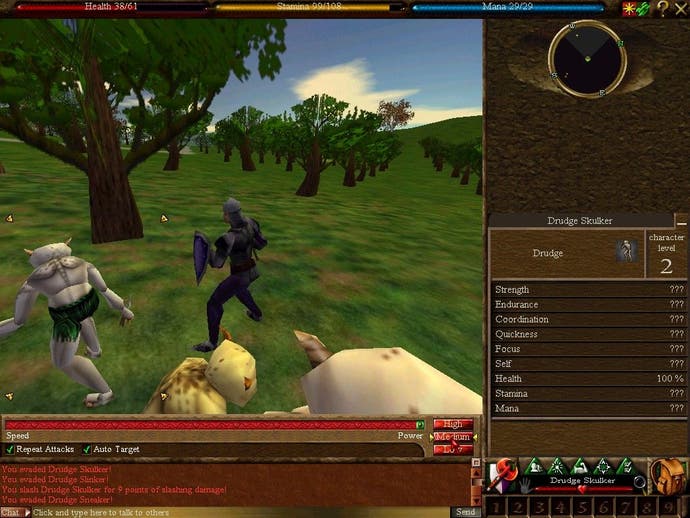
Added Value
As well as tweaks to the game balance and the changes to the world caused by the game's on-going story, the regular patches for Asheron's Call also add entirely new features sometimes.
Recently coloured lighting was added to the game's graphics engine, greatly improving the atmosphere of the dungeons in particular, and several monsters have had new models and skins created for them. The new golem models are particularly spectacular, and put the original versions to shame.
This is something that we can expect to see continue, and Scott told us that "we will probably alternate between content months where we add new stuff (weapons, skills, spells, dungeons, quests, etc.) and months where we concentrate more on tech improvements (the magic interface, coloured lighting, etc.)."
Other games, such as Ultima Online and Everquest, rely mostly on mission packs to add new content and features to the game, but apparently this isn't something which Turbine have considered. "We plan on 'giving away' content on a monthly basis. Maybe after a year or so we might bundle up all the changes we've made and toss in some bonus stuff, but I don't see that as being too likely."
So what can we expect to see in the next few months? "Sorry, but the design team would kill me if I gave away what they're doing in the next few months. Let's just say that we're addressing some of the top concerns and complaints from our players... :)"
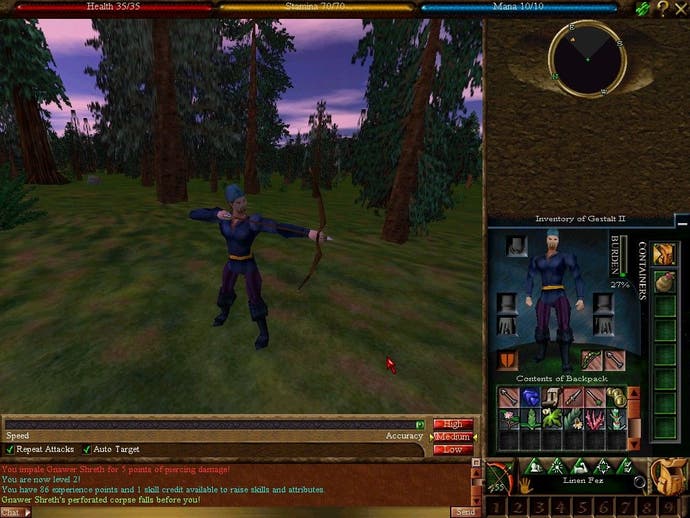
Euro Zone?
One major concern for many players here in Europe is the fact that at the moment all of the game's servers are based in America, especially as fast digital internet connections are still rare in many European countries.
Playing on a server which is located several thousand miles away using a 56k modem can lead to lag, and although Asheron's Call is designed to deal with the problem, we would obviously like to see some servers on this side of the Atlantic. Can we expect dedicated European servers for the game in future?
"We're waiting to see how the performance is for our European players and whether or not servers are needed", Scott told us. "We will be expanding the number of servers Asheron's Call is using in the near future, but I'm sure that Microsoft will do whatever is necessary to make sure our European players will have a great gaming experience."
Fingers crossed then...
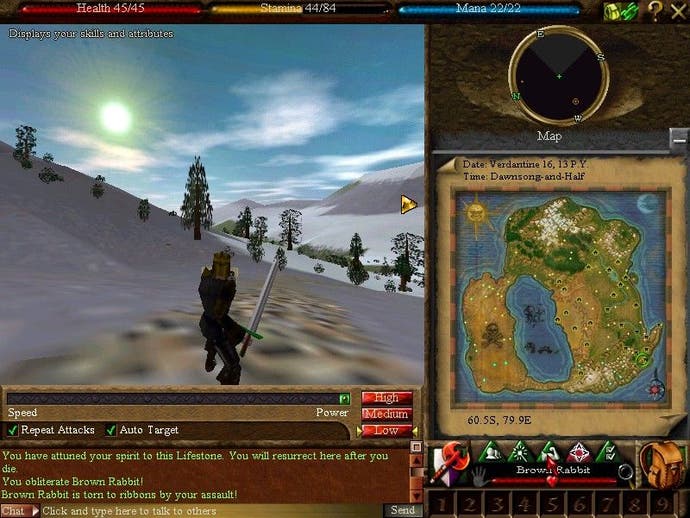
The Future
With a game under their belts now, Turbine are already hard at work on new games and technology. Unfortunately Scott couldn't tell us much about them yet, except that "the graphics engine has been totally revamped, and almost all of the core systems have been upgraded".
"We haven't made any official announcements about our next projects, we have only shown the latest Turbine Tech behind closed doors at the recent E3 - which seemed to really excite the few press people we showed it to."
It's not just the press that are getting excited though. Turbine are also planning to license the new technology to other companies wanting to build their own massively multiplayer and persistent world games... So why should other companies be interested in licensing somebody else's engine rather than developing their own from scratch?
"For other companies the advantage is obvious - it's proven technology", Scott explained. "If you look at any other massively multiplayer game out there, the development times are usually quite long (much longer than a standalone game, or non-persistent online game). By saving the time it takes to develop the tech, companies can focus in on balancing the gameplay."
Although engine licensing is common amongst developers of first person shooters, so far most massively multiplayer games are using their own engine. All that could be about to change though... According to Scott, "we have had some very serious talks with a number of partners on licensing the technology, and we'll probably have an announcement regarding that in the near future."
Intrigued? Hopefully we should know more soon...
-

